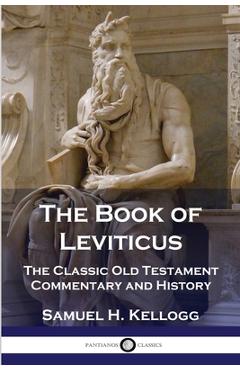The Book of Leviticus: The Classic Old Testament Commentary and History - Samuel H. Kellogg

Detalii The Book of Leviticus: The
libris.ro
126.33 Lei
140.37 Lei
Religion
Samuel H. Kellogg
The Book of Leviticus: The - Disponibil la libris.ro
Pe YEO găsești The Book of Leviticus: The de la Samuel H. Kellogg, în categoria Religion.
Indiferent de nevoile tale, The Book of Leviticus: The Classic Old Testament Commentary and History - Samuel H. Kellogg din categoria Religion îți poate aduce un echilibru perfect între calitate și preț, cu avantaje practice și moderne.
Preț: 126.33 Lei
Caracteristicile produsului The Book of Leviticus: The
- Brand: Samuel H. Kellogg
- Categoria: Religion
- Magazin: libris.ro
- Ultima actualizare: 28-10-2025 01:22:05
Comandă The Book of Leviticus: The Online, Simplu și Rapid
Prin intermediul platformei YEO, poți comanda The Book of Leviticus: The de la libris.ro rapid și în siguranță. Bucură-te de o experiență de cumpărături online optimizată și descoperă cele mai bune oferte actualizate constant.
Descriere magazin:
Samuel Kellogg\'s commentary on Leviticus is among the most in-depth and thorough yet written, discussing the major events, characters and lessons of the Old Testament book. Prior to beginning his analysis, the author gives a historical summary of the origins of Leviticus. Mindful of Christian readers, he also discusses the influence the book would have had on Jesus, who as a young student would have received education inclusive of this text. We are given a sense of the significance of the text, not simply in the spiritual sense of being the Word of God to Moses, but also its significance to the society of the time, for example dealing with lack of cleanliness and hygiene with animals and diseases such as leprosy. The author takes us through Leviticus in a chapter-by-chapter exposition, with every passage narrated and event described. His thoroughness is necessary: the book itself is thought to have been gradually composed and modified over a period spanning more than two centuries. The ethical and ritualistic elements of the book reflect the religious adherence and cultural evolution of the Hebrews, as Kellogg emphasizes in great detail. Though first published in 1899, this commentary remains valuable to Bible students to this day for its quality.

Produse asemănătoare

Jucarie de plus cu sunete, Play by Play, The Monster Book Of Monsters, Harry Potter, 32 x 24 x 8 cm
![]() noriel.ro
noriel.ro
Actualizat in 31/10/2025
139.99 Lei

Lego Icons The Lord Of The Rings Balrogtm Book Nook (10367)
![]() buygames.net
buygames.net
Actualizat in 31/10/2025
306.76 Lei

Star Wars The Black Series The Book of Boba Fett Luke Skywalker Grogu 15cm
![]() buygames.net
buygames.net
Actualizat in 31/10/2025
85.86 Lei
Produse marca Samuel H. Kellogg

The Book of Leviticus: The Classic Old Testament Commentary and History - Samuel H. Kellogg
![]() libris.ro
libris.ro
Actualizat in 28/10/2025
126.33 Lei


